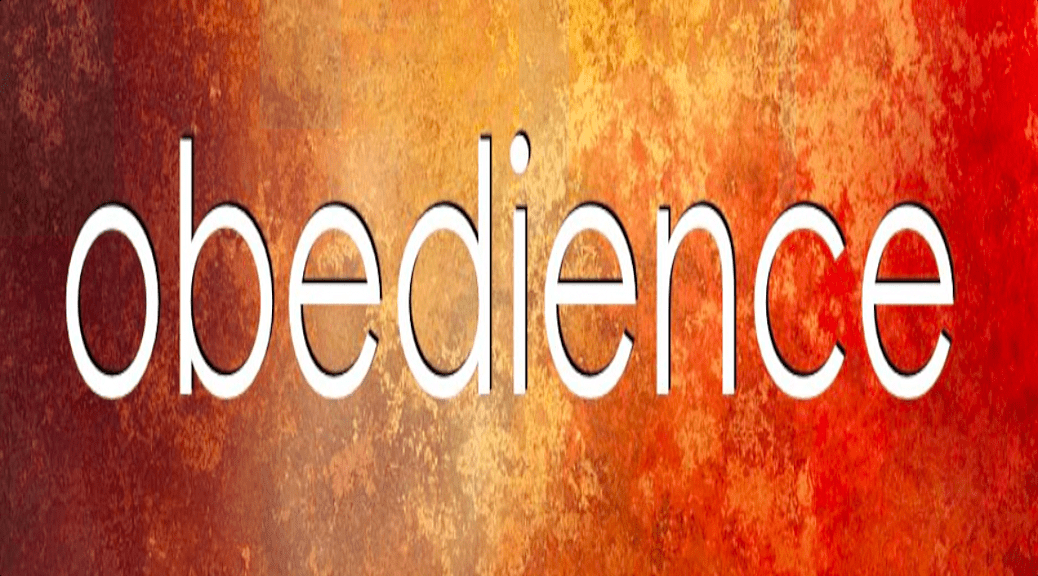Previous Post
Obedience is all important for the prophet. A prophet can and only must speak as the Lord speaks. The prophet must never speak out of his own will, or by his own desire or need. For this then becomes divination. A prophet must therefore always act under complete obedience. Whatever the Lord calls the prophet to say must be said, and whatever must be done it must be so and always according to God’s timing. It is never about the will of the prophet, but always about the will of God.
The prophet must never question God, even when it seems His ways are mysterious and makes little sense. We must remember we serve a supernatural God who works supernaturally. For us, the supernatural confounds our understanding, but God deals first in the supernatural so that it manifests in the natural. This is why many times the Lord calls for the prophet to do something which makes little sense in the natural, but it has a huge impact in the supernatural.
Paul understood this reality when he wrote in Ephesians 3: 8 To me, who am less than the least of all the saints, this grace was given, that I should preach among the Gentiles the unsearchable riches of Christ, 9 and to make all see what is the fellowship of the mystery, which from the beginning of the ages has been hidden in God who created all things through Jesus Christ; 10 to the intent that now the manifold wisdom of God might be made known by the church to the principalities and powers in the heavenly places, 11 according to the eternal purpose which He accomplished in Christ Jesus our Lord, 12 in whom we have boldness and access with confidence through faith in Him. 13 Therefore I ask that you do not lose heart at my tribulations for you, which is your glory.
We read therefore that Paul’s declaration of the wisdom of God (which must be made by the church) is for the purpose that it is known by the principalities and powers in the heavenly places. Paul was saying that the church – thus the Bride, therefore the true believers and disciples – are supposed to be declaring the manifold wisdom of God, including to the PRINCIPALITIES AND POWERS IN THE HEAVENLY
PLACES. Paul understood the impact of first addressing the spiritual realm, and for this reason, he spoke about our true spiritual war in 2 Corinthians 10 and Ephesians 6.
So when God calls a prophet to do something, then the prophet must not question, doubt, or argue, but just obey. For in the obedience, you will find the activation of power of such action, and thus the impact in the spiritual that manifests in the natural. It says in Isaiah 55: “For as the rain comes down, and the snow from heaven, And do not return there, But water the earth, And make it bring forth and bud, That it may give seed to the sower And bread to the eater, 11 So shall My word be that goes forth from My mouth; It shall not return to Me void, But it shall accomplish what I please, And it shall prosper in the thing for which I sent it.
According to Isaiah 55, the Lord speaks the Word to the prophet, and the prophet activates the Word through deed or action in the authority of God (never his own authority or cleverness). According to Romans 12:6, Christians with the gift of prophesying should prophesy in proportion to their faith. And since faith comes by hearing, the prophet who walks close with God shall walk in faith, for a prophet trusts and has faith in His Almighty God. And such spoken Word shall not return empty or void unto the Lord until it has completed what God has called it to complete. So the action of the prophet once acted upon in obedience shall fulfill the intended purpose of God. For we may not always understand, but God is in control. Again, the prophet merely obeys every instruction of God.
For example, we read in Hosea 1: The beginning of the word of the Lord by Hosea. And the Lord said to Hosea, Go, take unto thee a wife of whoredoms and children of whoredoms: for the land hath committed great whoredom, departing from the Lord. 3 So he went and took Gomer the daughter of Diblaim; which conceived, and bare him a son. 4 And the Lord said unto him, Call his name Jezreel; for yet a little while, and I will avenge the blood of Jezreel upon the house of Jehu, and will cause to cease the kingdom of the house of Israel. 5 And it shall come to pass at that day, that I will break the bow of Israel, in the valley of Jezreel. 6 And she conceived again, and bare a daughter. And God said unto him, Call her name Loruhamah: for I will no more have mercy upon the house of Israel; but I will utterly take them away. 7 But I will have mercy upon the house of Judah, and will save them by the Lord their God, and will not save them by bow, nor by sword, nor by battle, by horses, nor by horsemen. 8 Now when she had weaned Loruhamah, she conceived, and bare a son. 9 Then said God, Call his name Loammi: for ye are not my people, and I will not be your God. 10 Yet the number of the children of Israel shall be as the sand of the sea, which cannot be measured nor numbered; and it shall come to pass, that in the place where it was said unto them, Ye are not my people, there it shall be said unto them, Ye are the sons of the living God.
Can you imagine the shock and horror in churches today if a prophet has to take a prostitute as a wife? But Hosea had to do it, because he had no choice but to obey God. And the Lord gave the instruction for a good reason, for it spoke of the spiritual condition of the people and how far they had fallen from their ways of following God. The Lord was setting an example and used the marriage as a prophetic action.
Moses, the prophet who obeyed the Lord so many times by leading the people out of Egypt and through the wilderness for 40 years, stumbled in obedience in Numbers 20: 7 And the Lord spake unto Moses, saying, 8 Take the rod, and gather thou the assembly together, thou, and Aaron thy brother, and speak ye unto the rock before their eyes; and it shall give forth his water, and thou shalt bring forth to them water out of the rock: so thou shalt give the congregation and their beasts drink. 9 And Moses took the rod from before the Lord, as he commanded him. 10 And Moses and Aaron gathered the congregation together before the rock, and he said unto them, Hear now, ye rebels; must we fetch you water out of this rock? 11 And Moses lifted up his hand, and with his rod he smote the rock twice: and the water came out abundantly, and the congregation drank, and their beasts also. 12 And the Lord spake unto Moses and Aaron, Because ye believed me not, to sanctify me in the eyes of the children of Israel, therefore ye shall not bring this congregation into the land which I have given them.
Moses many times had to perform ‘strange’ wonders, such as lifting the staff to part the Red Sea, watching his leprous hand become healed, and picking up a snake by the tail for it to become a staff. Another example is found in Numbers 21: 4 Then they journeyed from Mount Hor by the Way of the Red Sea, to go around the land of Edom; and the soul of the people became very discouraged on the way. 5 And the people spoke against God and against Moses: “Why have you brought us up out of Egypt to die in the wilderness? For there is no food and no water, and our soul loathes this worthless bread.” 6 So the Lord sent fiery serpents among the people, and they bit the people; and many of the people of Israel died. 7 Therefore the people came to Moses, and said, “We have sinned, for we have spoken against the Lord and against you; pray to the Lord that He take away the serpents from us.” So Moses prayed for the people. 8 Then the Lord said to Moses, “Make a fiery serpent, and set it on a pole; and it shall be that everyone who is bitten, when he looks at it, shall live.” 9 So Moses made a bronze serpent, and put it on a pole; and so it was, if a serpent had bitten anyone, when he looked at the bronze serpent, he lived.
Everything is about obedience, trust, and faith in God for the prophet. The prophet must therefore be completely in unity with God and must act as the Lord speaks and must never disobey. Consider again the story in 1 Kings 13 of a prophet that was sent to speak a word to Jeroboam. Once the prophet had completed his assignment, we find that another prophet, an old man, invites this prophet over to dine with them. This would have been against the Lord’s instruction. And the outcome of the disobedience was that the disobedient prophet was killed by the lion.
God gave the prophet clear instructions, but the prophet allowed himself to be deceived by man, even though it was another prophet who was not acting upon instructions from the Lord. Thus, the prophet may and can only speak as the Lord directs, and can only act upon God’s Word, nothing else.
Let us read the following story from 1 Kings 22 (NKJV): 1 Now three years passed without war between Syria and Israel. 2 Then it came to pass, in the third year, that Jehoshaphat the king of Judah went down to visit the king of Israel. 3 And the king of Israel said to his servants, “Do you know that Ramoth in Gilead is ours, but we hesitate to take it out of the hand of the king of Syria?” 4 So he said to Jehoshaphat, “Will you go with me to fight at Ramoth Gilead?” Jehoshaphat said to the king of Israel, “I am as you are, my people as your people, my horses as your horses.” 5 Also Jehoshaphat said to the king of Israel, “Please inquire for the word of the Lord today.” 6 Then the king of Israel gathered the prophets together, about four hundred men, and said to them, “Shall I go against Ramoth Gilead to fight, or shall I refrain?” So they said, “Go up, for the Lord will deliver it into the hand of the king.” 7 And Jehoshaphat said, “Is there not still a prophet of the Lord here, that we may inquire of Him?” 8 So the king of Israel said to Jehoshaphat, “There is still one man, Micaiah the son of Imlah, by whom we may inquire of the Lord; but I hate him, because he does not prophesy good concerning me, but evil.” And Jehoshaphat said, “Let not the king say such things!” 9 Then the king of Israel called an officer and said, “Bring Micaiah the son of Imlah quickly!” 10 The king of Israel and Jehoshaphat the king of Judah, having put on their robes, sat each on his throne, at a threshing floor at the entrance of the gate of Samaria; and all the prophets prophesied before them. 11 Now Zedekiah the son of Chenaanah had made horns of iron for himself; and he said, “Thus says the Lord: ‘With these you shall gore the Syrians until they are destroyed.’ ” 12 And all the prophets prophesied so, saying, “Go up to Ramoth Gilead and prosper, for the Lord will deliver it into the king’s hand.” 13 Then the messenger who had gone to call Micaiah spoke to him, saying, “Now listen, the words of the prophets with one accord encourage the king. Please, let your word be like the word of one of them, and speak encouragement.” 14 And Micaiah said, “As the Lord lives, whatever the Lord says to me, that I will speak.” 15 Then he came to the king; and the king said to him, “Micaiah, shall we go to war against Ramoth Gilead, or shall we refrain?” And he answered him, “Go and prosper, for the Lord will deliver it into the hand of the king!” 16 So the king said to him, “How many times shall I make you swear that you tell me nothing but the truth in the name of the Lord?” 17 Then he said, “I saw all Israel scattered on the mountains, as sheep that have no shepherd. And the Lord said, ‘These have no master. Let each return to his house in peace.’ ” 18 And the king of Israel said to Jehoshaphat, “Did I not tell you he would not prophesy good concerning me, but evil?” 19 Then Micaiah said, “Therefore hear the word of the Lord: I saw the Lord sitting on His throne, and all the host of heaven standing by, on His right hand and on His left. 20 And the Lord said, ‘Who will persuade Ahab to go up, that he may fall at Ramoth Gilead?’ So one spoke in this manner, and another spoke in that manner. 21 Then a spirit came forward and stood before the Lord, and said, ‘I will persuade him.’ 22 The Lord said to him, ‘In what way?’ So he said, ‘I will go out and be a lying spirit in the mouth of all his prophets.’ And the Lord said, ‘You shall persuade him, and also prevail. Go out and do so.’ 23 Therefore look! The Lord has put a lying spirit in the mouth of all these prophets of yours, and the Lord has declared disaster against you.”
In this story, we find how 400 hundred prophets lied to the kings. Yes, all the so-called prophets lied! Were they merely misguided, or even treacherous in their deception? We discover that they were influenced by a lying spirit, thus they were under the influence of divination. God had allowed the spirit to influence the prophets. We might not know why, maybe God was testing them or maybe it was to prove they were not true prophets of the Lord. Micah, however, stayed true to the Lord and spoke the Word as God Him, and the Word contradicted the word of the 400 prophets. As we discover in this chapter, his warning came true.
This is of critical importance: The prophet must only declare what God says, and must never be persuaded by man, by culture, or by any other truth. A prophet never speaks for his own fain, profit, or to please man or to gain favor. He speaks the will and the heart of God, for the glory of God, and to the glory of God. Indeed, God does not take lightly to those who pretend to speak in His Name or who pretend to speak His Truth. God shall not be mocked. This is clear and evident in Ezekiel 13 NKJV: 1 And the word of the Lord came to me, saying, 2 “Son of man, prophesy against the prophets of Israel who prophesy, and say to those who prophesy out of their own heart, ‘Hear the word of the Lord!’ ” 3 Thus says the Lord God: “Woe to the foolish prophets, who follow their own spirit and have seen nothing! 4 O Israel, your prophets are like foxes in the deserts. 5 You have not gone up into the gaps to build a wall for the house of Israel to stand in battle on the day of the Lord. 6 They have envisioned futility and false divination, saying, ‘Thus says the Lord!’ But the Lord has not sent them; yet they hope that the word may be confirmed. 7 Have you not seen a futile vision, and have you not spoken false divination? You say, ‘The Lord says,’ but I have not spoken.” 8 Therefore thus says the Lord God: “Because you have spoken nonsense and envisioned lies, therefore I am indeed against you,” says the Lord God. 9 “My hand will be against the prophets who envision futility and who divine lies; they shall not be in the assembly of My people, nor be written in the record of the house of Israel, nor shall they enter into the land of Israel. Then you shall know that I am the Lord God. 10 “Because, indeed, because they have seduced My people, saying, ‘Peace!’ when there is no peace—and one builds a wall, and they plaster it with untempered mortar— 11 say to those who plaster it with untempered mortar, that it will fall. There will be flooding rain, and you, O great hailstones, shall fall; and a stormy wind shall tear it down. 12 Surely, when the wall has fallen, will it not be said to you, ‘Where is the mortar with which you plastered it?’ ”
When it comes to complete and utter obedience, consider Ezekiel 4: “You also, son of man, take a clay tablet and lay it before you, and portray on it a city, Jerusalem. 2 Lay siege against it, build a siege wall against it, and heap up a mound against it; set camps against it also, and place battering rams against it all around. 3 Moreover take for yourself an iron plate, and set it as an iron wall between you and the city. Set your face against it, and it shall be besieged, and you shall lay siege against it. This will be a sign to the house of Israel. 4 “Lie also on your left side, and lay the iniquity of the house of Israel upon it. According to the number of the days that you lie on it, you shall bear their iniquity. 5 For I have laid on you the years of their iniquity, according to the number of the days, three hundred and ninety days; so you shall bear the iniquity of the house of Israel. 6 And when you have completed them, lie again on your right side; then you shall bear the iniquity of the house of Judah forty days. I have laid on you a day for each year. 7 “Therefore you shall set your face toward the siege of Jerusalem; your arm shall be uncovered, and you shall prophesy against it. 8 And surely I will restrain you so that you cannot turn from one side to another till you have ended the days of your siege. 9 “Also take for yourself wheat, barley, beans, lentils, millet, and spelt; put them into one vessel, and make bread of them for yourself. During the number of days that you lie on your side, three hundred and ninety days, you shall eat it. 10 And your food which you eat shall be by weight, twenty shekels a day; from time to time you shall eat it. 11 You shall also drink water by measure, one-sixth of a hin; from time to time you shall drink. 12 And you shall eat it as barley cakes; and bake it using fuel of human waste in their sight.” 13 Then the Lord said, “So shall the children of Israel eat their defiled bread among the Gentiles, where I will drive them.”
And also Ezekiel 5 NKJV: “And you, son of man, take a sharp sword, take it as a barber’s razor, and pass it over your head and your beard; then take scales to weigh and divide the hair. 2 You shall burn with fire one-third in the midst of the city, when the days of the siege are finished; then you shall take one-third and strike around it with the sword, and one-third you shall scatter in the wind: I will draw out a sword after them. 3 You shall also take a small number of them and bind them in the edge of your garment. 4 Then take some of them again and throw them into the midst of the fire, and burn them in the fire. From there a fire will go out into all the house of Israel. 5 “Thus says the Lord God: ‘This is Jerusalem; I have set her in the midst of the nations and the countries all around her. 6 She has rebelled against My judgments by doing wickedness more than the nations, and against My statutes more than the countries that are all around her; for they have refused My judgments, and they have not walked in My statutes.’ 7 Therefore thus says the Lord God: ‘Because you have multiplied disobedience more than the nations that are all around you, have not walked in My statutes nor kept My judgments, nor even done according to the judgments of the nations that are all around you’— 8 therefore thus says the Lord God: ‘Indeed I, even I, am against you and will execute judgments in your midst in the sight of the nations. 9 And I will do among you what I have never done, and the like of which I will never do again, because of all your abominations.
Consider the actions of Jeremiah in chapter 13: Thus the Lord said to me: “Go and get yourself a linen sash, and put it around your waist, but do not put it in water.” 2 So I got a sash according to the word of the Lord, and put it around my waist. 3 And the word of the Lord came to me the second time, saying, 4 “Take the sash that you acquired, which is around your waist, and arise, go to the Euphrates, and hide it there in a hole in the rock.” 5 So I went and hid it by the Euphrates, as the Lord commanded me. 6 Now it came to pass after many days that the Lord said to me, “Arise, go to the Euphrates, and take from there the sash which I commanded you to hide there.” 7 Then I went to the Euphrates and dug, and I took the sash from the place where I had hidden it; and there was the sash, ruined. It was profitable for nothing. 8 Then the word of the Lord came to me, saying, 9 “Thus says the Lord: ‘In this manner I will ruin the pride of Judah and the great pride of Jerusalem. 10 This evil people, who refuse to hear My words, who follow the dictates of their hearts, and walk after other gods to serve them and worship them, shall be just like this sash which is profitable for nothing. 11 For as the sash clings to the waist of a man, so I have caused the whole house of Israel and the whole house of Judah to cling to Me,’ says the Lord, ‘that they may become My people, for renown, for praise, and for glory; but they would not hear.’
None of the actions implemented by Hosea, Jeremiah, or Ezekiel may make much sense, but the prophets acted out of obedience and thus what God spoke came into fulfillment. As mentioned, Moses was one of the great prophets, and he often worked in the supernatural. Consider the following in Exodus 4: So the Lord said to him, “What is that in your hand?” He said, “A rod.” 3 And He said, “Cast it on the ground.” So he cast it on the ground, and it became a serpent; and Moses fled from it. 4 Then the Lord said to Moses, “Reach out your hand and take it by the tail” (and he reached out his hand and caught it, and it became a rod in his hand), 5 “that they may believe that the Lord God of their fathers, the God of Abraham, the God of Isaac, and the God of Jacob, has appeared to you.”
Or how about Exodus 15: 22 So Moses brought Israel from the Red Sea; then they went out into the Wilderness of Shur. And they went three days in the wilderness and found no water. 23 Now when they came to Marah, they could not drink the waters of Marah, for they were bitter. Therefore the name of it was called Marah. 24 And the people complained against Moses, saying, “What shall we drink?” 25 So he cried out to the Lord, and the Lord showed him a tree. When he cast it into the waters, the waters were made sweet. Moses after all was the one who raised his staff for the Red Sea to part in two, who struck the rock for the water to flow, and so on.
Consider 2 Kings 6 of Elijah: And the sons of the prophets said to Elisha, “See now, the place where we dwell with you is too small for us. 2 Please, let us go to the Jordan, and let every man take a beam from there, and let us make there a place where we may dwell.” So he answered, “Go.” 3 Then one said, “Please consent to go with your servants.” And he answered, “I will go.” 4 So he went with them. And when they came to the Jordan, they cut down trees. 5 But as one was cutting down a tree, the iron ax head fell into the water; and he cried out and said, “Alas, master! For it was borrowed.” 6 So the man of God said, “Where did it fall?” And he showed him the place. So he cut off a stick, and threw it in there; and he made the iron float. 7 Therefore he said, “Pick it up for yourself.” So he reached out his hand and took it.
In 1 Kings 17 we read: And Elijah the Tishbite, of the inhabitants of Gilead, said to Ahab, “As the Lord God of Israel lives, before whom I stand, there shall not be dew nor rain these years, except at my word.” … Elijah and the Widow: 8 Then the word of the Lord came to him, saying, 9 “Arise, go to Zarephath, which belongs to Sidon, and dwell there. See, I have commanded a widow there to provide for you.” 10 So he arose and went to Zarephath. And when he came to the gate of the city, indeed a widow was there gathering sticks. And he called to her and said, “Please bring me a little water in a cup, that I may drink.” 11 And as she was going to get it, he called to her and said, “Please bring me a morsel of bread in your hand.” 12 So she said, “As the Lord your God lives, I do not have bread, only a handful of flour in a bin, and a little oil in a jar; and see, I am gathering a couple of sticks that I may go in and prepare it for myself and my son, that we may eat it, and die.” 13 And Elijah said to her, “Do not fear; go and do as you have said, but make me a small cake from it first, and bring it to me; and afterward make some for yourself and your son. 14 For thus says the Lord God of Israel: ‘The bin of flour shall not be used up, nor shall the jar of oil run dry, until the day the Lord sends rain on the earth.’ ” 15 So she went away and did according to the word of Elijah; and she and he and her household ate for many days. 16 The bin of flour was not used up, nor did the jar of oil run dry, according to the word of the Lord which He spoke by Elijah.
As the true prophets move in God’s power, we find a manifestation of Kingdom power, and by that power is the power to align, shift, plant, build, destroy, deliver, or judge. The prophetic deal with the authority of God and it also deals with the manifestation of such authority. And such manifested power brings about God’s Word, and it can also bring about healing and restoration.
The prophet thus does speak by saying “thus says the Lord’, and acts upon the instructions of the Lord, no matter how strange, because the prophet seeks the will of God and the way of God. This is the mark of a true prophet. One who will never compromise, or disobey. For the prophet, bringing glory to God is all important, and remaining in the will of God.
God does nothing without warning his people first. Part of the prophetic role is to therefore release God’s activity. Isaiah spoke of God stretching out his hand according to his plan.
The Lord Almighty has sworn, “Surely, as I have planned, so it will be, and as I have purposed, so it will stand… This is the plan determined for the whole world; this is the hand stretched out over all nations. For the Lord Almighty has purposed, and who can thwart him? His hand is stretched out, and who can turn it back? (Isaiah 14:24-27).
Next Page







